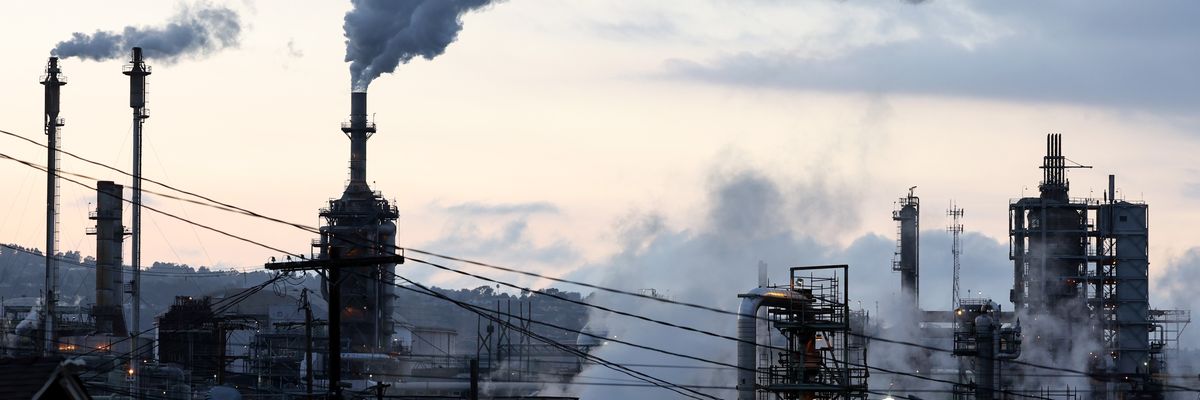Amid a summer of extreme heat across the Northern Hemisphere, an international report led by the U.S. National Oceanic and Atmospheric Administration revealed Wednesday that greenhouse gas concentrations, global sea level, and ocean heat content hit record highs last year.
"This report is a truly international effort to more fully understand climate conditions around the globe and our capacity to observe them," NOAA National Centers for Environmental Information (NCEI) Director Derek Arndt said of State of the Climate in 2022, which features contributions from more than 570 scientists in over 60 countries.
"It is like an annual physical of the Earth system, and it serves present and future generations by documenting and sharing data that indicate increasingly extreme and changing conditions in our warming world," Arndt added of the 33rd annual report, published by the Bulletin of the American Meteorological Society.
As humanity continued to extract and burn fossil fuels and engage in polluting agricultural practices, all three of the main atmospheric greenhouse gases—carbon dioxide, methane, and nitrous oxide—reached record concentrations last year. The CO2 average was 417.1 parts per million, topping not only modern observational records but also paleoclimatic records that go back as far as 800,000 years.
"People are causing the largest known change in global climate since our transition to agriculture thousands of years ago," said Paul Higgins, associate executive director of the American Meteorological Society.
In the ocean—which has absorbed most warming from greenhouse gases in recent decades—heat content rose to record highs last year. The annual surface temperature was 0.45-0.54°F above the 1991-2020 average, making 2022 among the six warmest years since record-keeping began in the 1800s and the hottest La Niña year on record. The global mean sea level set a record for the 11th straight year, rising about 4 inches above the 1993 average, when satellite measurements began.
While approximately 58% of the ocean surface endured at least one marine heatwave, temperatures also soared on land. As the report details:
Europe as a whole observed its second-warmest year on record, with 16 individual countries observing record warmth at the national scale. Records were shattered across the continent during the summer months as heatwaves plagued the region. On July 18, 104 stations in France broke their all-time records. One day later, England recorded a temperature of 40°C [104°F] for the first time ever. China experienced its second-warmest year and warmest summer on record. In the Southern Hemisphere, the average temperature across New Zealand reached a record high for the second year in a row. While Australia's annual temperature was slightly below the 1991-2020 average, Onslow Airport in Western Australia reached 50.7°C [123°F] on January 13, equaling Australia's highest temperature on record.
[...]
The effects of rising temperatures and extreme heat were apparent across the Northern Hemisphere, where snow-cover extent by June 2022 was the third smallest in the 56-year record, and the seasonal duration of lake ice cover was the fourth shortest since 1980. More frequent and intense heatwaves contributed to the second-greatest average mass balance loss for Alpine glaciers around the world since thestart of the record in 1970. Glaciers in the Swiss Alps lost a record 6% of their volume. In South America, the combination of drought and heat left many central Andean glaciers snowfree by mid-summer in early 2022.
Nearly a third of global land faced moderate or worse drought in 2022, from a 63% footprint in the contiguous United States to the continuation of a 13-year megadrought in central Chile. The report notes that an ongoing drought in Africa has "led to crop failure, millions of livestock deaths, water scarcity, and inflated prices for staple food items."
Meanwhile, in South Asia, "Pakistan received around three times its normal volume of monsoon precipitation in August, with some
regions receiving up to eight times their expected monthly totals," the report highlights. "Resulting floods affected over 30 million people, caused over 1,700 fatalities, led to major crop and property losses, and was recorded as one of the world's costliest natural disasters of all time."
Global conditions last year and Big Oil's record profits fueled demands for bold action to overhaul agricultural practices and stop burning fossil fuels—which, as the report points out, is "the main driver of increasing atmospheric CO2." Such calls have continued in recent months, as oil and gas giants kept rewarding shareholders with hefty stock buybacks and dividends during what has been another historically hot summer, according to data released Tuesday.
"Our planet has just endured a season of simmering—the hottest summer on record," United Nations Secretary-General António Guterres said Wednesday, less than three months away from the U.N. COP28 summit. "Leaders must turn up the heat now for climate solutions."




